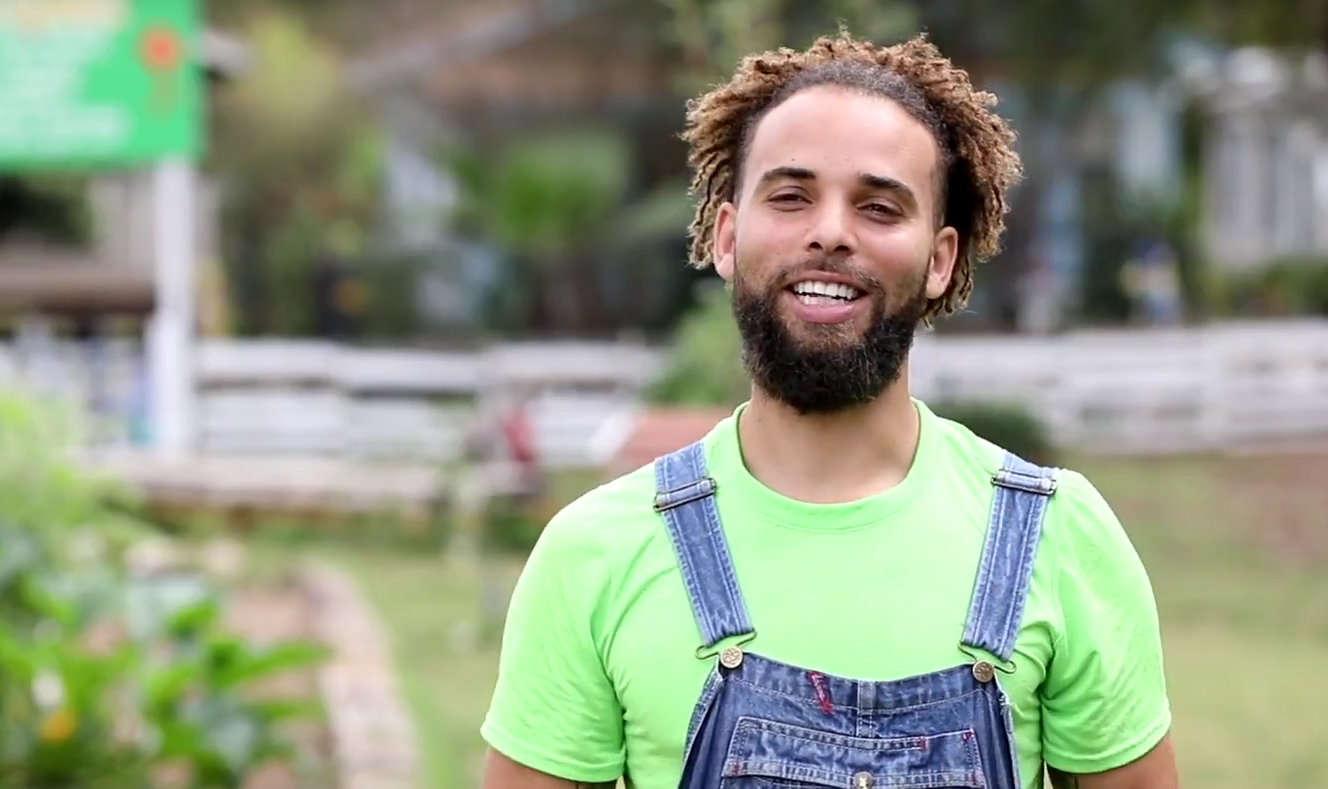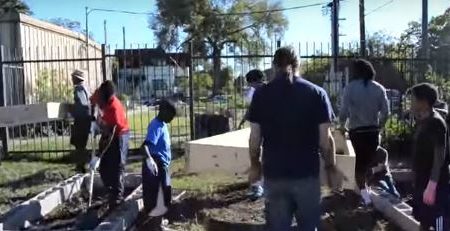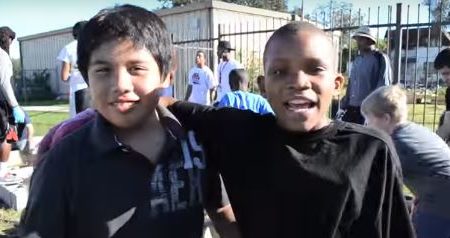Share On Social!
Stephen Lucke’s life forever when he took a college nutrition class.
Lucke, an aspiring doctor who was studying biochemistry at University of the Incarnate Word in San Antonio, Texas (63% Latino) a few years ago, realized that healthy food could help stop people from getting sick in the first place.

He was so motivated to help that he immediately helped start a campus wellness program in 2011.
He helped start a fruit and vegetable garden on campus a few months later.
“I just really became educated about the obesity epidemic,” Lucke said. “You know San Antonio was the most obese city in 2007.”
Food Access Needed in San Antonio
As he worked to maintain gardens on the UIW campus, Lucke began to realize a severe lack of community gardens and a lack of garden education in schools in impoverished areas, such as San Antonio’s eastside.
In this heavily Latino part of town, healthy food is often tough to find.
Grocery stores are few and fast food is abundant.
Obesity rates are high—just as they typically are in low-income areas, Lucke said.
With the success of the UIW campus garden initiative, Lucke wanted to see if something similar would prove as effective at promoting a healthy lifestyle and overall health in low-income neighborhoods.
Engaging Schools to Push Youth Gardening
Lucke partnered with Dr. Jeff Crane, a professor of his at UIW, to start youth educational gardens for an afterschool and summer program at the Ella Austin Community Center in fall 2013.
This effort showed him the need to increase access to gardens for children by putting them near schools, or in school curricula.
The Benefits of Gardening
- Can reduce the risk of stroke
- Burns calories while actively gardening
- Strengthens immune systems
- Can provide families and communities with fresh produce
Studies have shown that if a child grows vegetables in their early years, they are more likely to consume more fruits and vegetables later in life.
Lucke contacted Anita O’Neal, the principal of Bowden Elementary School, with his idea for school gardens. With her permission and help, Lucke and O’Neal, gained approval from school district leaders to rebuild the Bowden’s gardens and test out a garden based curriculum on a classroom of students. Lucke helped repair existing beds and bring in a new bed, too. He worked on the gardens with help from Bowden second-grade teacher Laura Ruiz, who supervised both the gardens and garden-based curriculum, which was implemented in 2014.
During that time, students were able to harvest eggplants, bell peppers, broccoli, cauliflower, lettuce, tomatoes, and jalapeños.
A New Seed for Healthy Change: Gardopia
Around that time, Lucke had to work with Victor Zuniga, a property manager for Franklin Management, about a community garden for the Sutton Oaks Apartment complexes.
Lucke learned that the San Antonio Housing Authority (SAHA) wanted to use funding—from the Promise Grant, the Choice Grant, and the Byrne Grant—to start community gardens on some vacant lots on North New Braunfels Avenue in the eastside to boost crime prevention through environmental design (CPTED).
Lucke dreamed of starting a garden utopia for the area, where crime would be reduced, produce would be grown for the community and a culture around health would grow.

So he partnered with SAHA to plan the gardens and build community support.
“I didn’t have any money to go purchase these vacant lots,” Lucke said. “It was just a blessing when SAHA said, ‘We want you to do this.’”
In late 2015, they broke ground on the two vacant lots on N. New Braunfels. They got donations for gardening supplies, enlisted volunteers, and planned community events.
To galvanize all his efforts together, Lucke launched a new nonprofit, called Gardopia, using funding from Awesome SA.
This status and funding allowed him to continue to manage the garden and implement his garden-based curriculum in other schools in San Antonio.
Lucke’s vision of Gardopia is to serve as an education-based non-profit organization with a mission to teach communities about the importance of practicing wellness in their daily lives through gardening, creating a healthier, more educated, and environmentally sustainable society.
“I did not expect the support (for Gardopia). I just knew I wanted to do something and continue with it,” Lucke told The Rivard Report. “I’m not a businessman and it’s been a struggle with the organizational structure. There have been a lot of times when I wanted to quit. But we created those partners, worked with the youth. The energy, the hope, the role modeling, the education makes it all worth it.”
Making a Difference in Healthy Food Access

The organization now helps serve San Antonio Independent School District (SAISD) schools and hopes to partner with similar organizations to maintain and teach gardens all across San Antonio.
Project-based lessons in the schools tie fruits, vegetables, and gardening into multiple subjects while students continue to care for the gardens. Students have also been encouraged to take harvested produce home to their families, and cook healthy meals with.
“I think just being exposed to the garden, that it just shows them that, ‘Hey I can, even though I’m an elementary kid, I can make a difference, I can do things,’” Ruiz explained. “They have some kind of empowerment to do things and make changes, even if it’s not something their families are used to or their used to seeing or doing. It’s like the world is theirs to take ownership of, it just opens their world.”
Meanwhile, gardening continues at the North New Braunfels Avenue community gardens from 10 a.m. to noon every Saturday, Lucke said.
Even though the lots for the other gardens aren’t officially purchased yet, Lucke has plenty of plans for the garden center. He wants to develop a wellness center with a fresh juice and smoothie bar, cooking classes, counseling sessions, an and a small outdoor gym.
Lucke also wants to add a weekly farmers market, use vacant lots for micro-farms, and sell mulch, soil, and seedlings to help build the garden, and provide jobs for locals in the community.
His main focus is staying planted in the Eastside, where education and access to healthy food remain a need he is dedicated to filling.
“This is where we got started and we always want to serve,” he said. “My goal is to be able to serve—in the next year to two—every public school on the Eastside and then eventually into the charter schools.”
Watch Lucke’s video about his gardens.
By The Numbers
1
Supermarket
for every Latino neighborhood, compared to 3 for every non-Latino neighborhood
This success story was produced by Salud America! with support from the Robert Wood Johnson Foundation.
The stories are intended for educational and informative purposes. References to specific policymakers, individuals, schools, policies, or companies have been included solely to advance these purposes and do not constitute an endorsement, sponsorship, or recommendation. Stories are based on and told by real community members and are the opinions and views of the individuals whose stories are told. Organization and activities described were not supported by Salud America! or the Robert Wood Johnson Foundation and do not necessarily represent the views of Salud America! or the Robert Wood Johnson Foundation.



